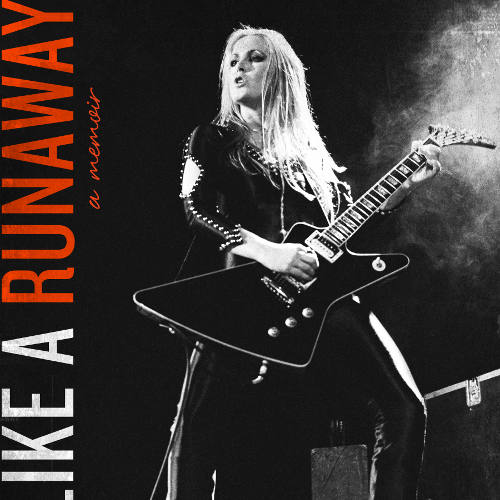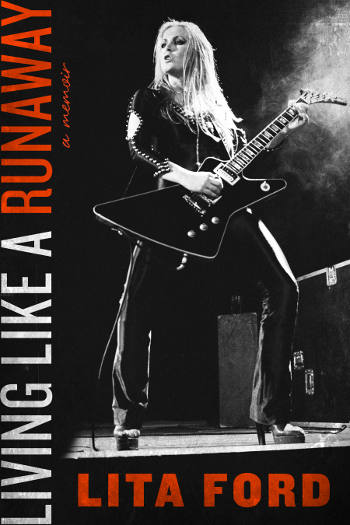
by Alexandra Mrozowska
– Sr. Columnist —
 A part of the groundbreaking all-girl band The Runaways in the 1970s and a successful solo artist in male-dominated industry throughout the 1980s, Lita Ford is undoubtedly an important figure in rock annals. However, the vast majority of attention focused on her in recent years was not related to her achievements. From the eyebrow-raising 2009 release Wicked Wonderland to the convolutions of her “ugly” divorce with Jim Gillette, it’s been mostly rumors and bad press going on. But perhaps, this is the reason behind the personal undertones of her 2012 album Living Like A Runaway as well as the autobiography to see the light of day this year via Dey Street Books. Aptly titled Lita Ford – Living Like A Runaway: A Memoir, the self-penned book marks the right moment to set all the story straight… or Ford’s part of it, at least.
A part of the groundbreaking all-girl band The Runaways in the 1970s and a successful solo artist in male-dominated industry throughout the 1980s, Lita Ford is undoubtedly an important figure in rock annals. However, the vast majority of attention focused on her in recent years was not related to her achievements. From the eyebrow-raising 2009 release Wicked Wonderland to the convolutions of her “ugly” divorce with Jim Gillette, it’s been mostly rumors and bad press going on. But perhaps, this is the reason behind the personal undertones of her 2012 album Living Like A Runaway as well as the autobiography to see the light of day this year via Dey Street Books. Aptly titled Lita Ford – Living Like A Runaway: A Memoir, the self-penned book marks the right moment to set all the story straight… or Ford’s part of it, at least.
Dedicated to the memory of The Runaways’ drummer Sandy West, Living Like A Runaway is divided into two parts. First chronicles Lita Ford’s early days along with her entire tenure in The Runaways, whereas the other covers all events that happened afterwards, a time span dominated mostly by her solo career. The foreword is provided by Twisted Sister frontman Dee Snider, credible in this role with his personal knowledge of the story’s protagonist and the similarity of their experiences. The first person narration Ford uses throughout the entire book corresponds with the emotional and very personal tone that prevails in it. It’s all complemented by relatively simple, straightforward language which doesn’t go for overdrawn metaphors or comparisons but rather reflects everyday life of the author. It’s more than a memoir than the chronicle indeed – nonlinear, with frequent usage of retrospectives and digressions, all embellished with a vast number of various vignettes. Although the majority of them were built around a fair share of sex, drugs and rock’n’roll – famous names involved – the striking feature of Ford’s narration is the usual avoidance of tabloid rhetoric. Many details are thus left to the reader’s imagination. Another asset to the book is Living Like A Runaway not being overloaded with photos, a clear stance from a woman choosing not to be praised by her looks only.
Starting from the day of her 16th birthday party and all the way back to her early childhood, Ford starts her journey down the memory lane. She recalls her school days, her first experiences with guitar playing as well as a detailed story of her family and upbringing. The latter reveals the strong bond between her and her supportive parents which is one of the leitmotifs of the entire book. Every reader who’s even been a music fan – regardless of their gender and professional career – can relate to the author’s memories of the ecstatic, eye-opening experience of seeing Black Sabbath for the first time at the tender age of 13 or her trip to California Jam ’74 to see Deep Purple. A large part of the book is subjected to music-related events, the audition for The Runaways being its turning point – from then on, you’re guided through the notorious world of show business with all its twists and turns from the perspective of a teenage girl. It’s also a unique insight into The Runaways from their embryonic phase onto their development and demise – the tale of making music, going through puberty, touring, cruel managers, sex, meltdowns, pregnancies, drugs, alcohol, personal conflicts and abusive lovers. Although the author doesn’t make the band’s manager Kim Fowley or her former bandmates the villains of the story, she remains critical towards them and certain experiences from the past. From today’s perspective, she looks at past conflicts with maturity and understanding, but admits she had neither years ago. She’s neither demonizing, nor embellishing the story of The Runaways; therefore, her account of the events seems authentic and honest.
Further into the book, a reader traces Lita’s solo career, its development, demise and revival. In her retrospective stories, both onstage and backstage, she remains the proverbial “one of the boys”, keeping up with the standards of rock’n’roll life. However, in spite of her wild party ways, she’s also a fearless, determined band leader focused on her goals and work. In regard to her musical role-models, she remains a devoted fan. Yet, her musings on the relationship with Black Sabbath’s Tony Iommi reveal the wide gap between the real man and the rock star, perhaps an educational dimension to the book for all girls who idolize their heroes? Ford offers an insight into the Rock/Hair Metal scene of the ‘70s and the ‘80s with all its staples, including the large influence of MTV on the latter decade. Many entertaining vignettes of her encounters with the late ‘70s Punk scene or bands like Judas Priest, Mötley Crüe or Bon Jovi are told. Between the story of recording, touring and sliding into debauchery, there’s also place for the teenage pregnancy and abortion, toxic relationships, backstage fights and ugly splits. Ford also pays a tribute to her deceased parents and details the joys of motherhood. All throughout the book, she doesn’t refrain from sharing the personal, or even the intimate and remains open about her sexuality. Although Living Like A Runaway is undoubtedly a rock star’s tale on success and debauchery, between the lines Ford speaks about things that are close to everyone – love, hate, family, dreams and passions we all share.
The book itself was labeled as “full of dirt.” The surprising thing, however, is that Lita Ford decided not to go for too many details regarding her hasty marriage to Jim Gillette, which surely would have made up the most scandalous and notorious part of her biography. As an author, she chooses to focus on her state of emotions throughout the years of marriage and the effect the instability of her household and isolation at the Caribbean exile had on her and her children. Rather than reproducing the rumors, she focuses on her side of the story. Symbolically, she also doesn’t mention a name of her husband anywhere in the book and tells a story of her tattoos which represent her oppression, breakout and supposed catharsis.
Living Like A Runaway is obviously interesting for a Rock fan. However, it may spark interest also among the gender studies or popular music scholars – even in spite of its tone, which is hardly a scholar one. Although Ford doesn’t call herself a feminist anywhere in the book, she actively campaigns for gender equality throughout her entire career. She thus shares a variety of stories on people’s ignorance, double standards, misogynistic attitude and various trickeries she experienced from her fellow rockers, managers and producers. Her sexual adventures with a whole variety of rock stars somewhat retell a myth of rock’n’roll debauchery where a woman is not an object anymore but a subject. Living Like A Runaway is thus not only a celebrity’s biography, but also a tale of woman’s lifetime struggle in the gendered world of Rock music.
There’s been a lot of boys whose bedrooms were graced by Lita Ford’s posters in the ‘80s and an equal number of girls who dreamt of being just like her. However, you don’t have to be either of them to enjoy Lita Ford – Living Like A Runaway: A Memoir as it’s simply a great read, driven by passion and lust for life. Ford isn’t much of a philosopher but she’s not trying to emulate one in her book – rather than that, she tells a simple but gripping tale of ups and downs of a female in the male-dominated music world. And even though she might not be entirely right in her saying this world’s become one hundred percent equal now – she certainly did much to open the doors for every woman who ever called herself a rocker. Living Like A Runaway is – first and foremost – an account of all this struggle. Recommended.
ISBN: 9780062270665
ISBN 10: 0062270664
Publisher: Dey Street Books
Website: www.deystreetbooks.com



